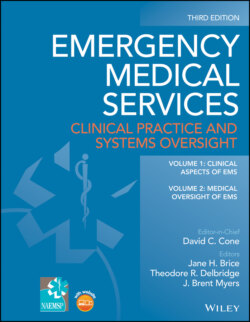Читать книгу Emergency Medical Services - Группа авторов - Страница 77
Research
ОглавлениеWhile there have been recent significant advances in airway management science, many important unanswered questions remain. In seeking new knowledge, it is important to recognize that retrospective observational data of prehospital airway management are all vulnerable to confounding by indication. Randomized controlled trial designs are necessary to result in the most accurate observations.
While informed by many observational series, the optimal approach to prehospital trauma airway management remains unclear [9]. An objective of prehospital airway management is to enable optimized ventilation. However, there have been few rigorous studies of prehospital ventilatory techniques. Davis, et al. observed that hyperventilation is common after prehospital RSI of traumatic brain injured patients and associated with worsened outcomes [46]. A before‐after study in Arizona suggested that avoidance of hypoxia, hyperventilation, and hypotension were important in optimizing traumatic brain injury outcomes [77]. The field requires additional study of ventilation strategies and mitigation of secondary injury.
